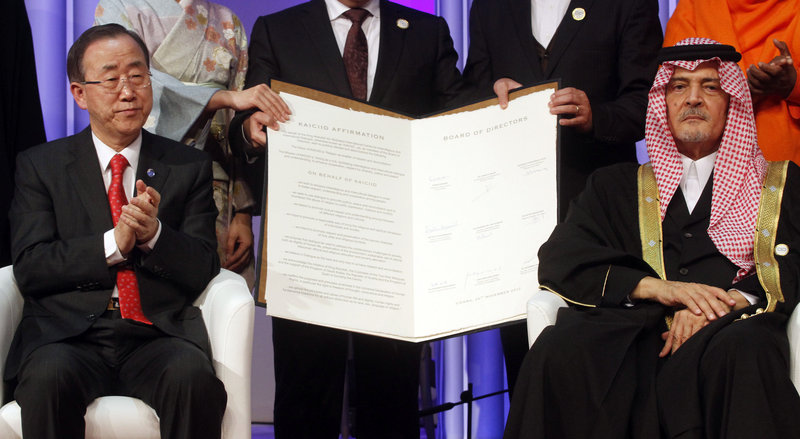VIENNA – U.N. Secretary-General Ban Ki-moon on Monday urged Israel and Hamas to respect their cease-fire but said only mutual recognition of Israel’s right to exist and an independent Palestine could ensure permanent peace in the region.
Ban commented during ceremonies launching a Saudi-sponsored and funded center in Vienna meant to promote dialogue between the world’s main religions. Ban’s pointed remarks were in contrast with other speakers who spoke in general terms about the need for religious understanding.
“I am determined to ensure that the cease-fire is sustained,” he said about last week’s agreement between Israel and Hamas committing both sides to stop hostilities and easing concerns of an Israeli invasion of Gaza.
Ban said that while both sides must adhere to the cease-fire, the ultimate goal in the region had to be a “two-state solution ending the (Israeli) occupation and the conflict,” adding: “This is critical to regional stability.”
The U.N. chief also said he is concerned about the destruction of religious artifacts by extremists in Mali, citing it as an example of the need to “promote long-term mutual understanding that transcends religious, national, cultural and ethnic boundaries.”
Other dignitaries included Saudi Foreign Minister Saud al-Faisal bin Abdulaziz Al Saud and his Austrian and Spanish counterparts, Michael Spindelegger and Jose Manual Garcia-Margallo y Marfil.
Their presence reflected their countries’ backing for the center, even though the Saudis are playing the most prominent role in organizing it and meeting its expenses for the first three years.
The three spoke in overall terms about the need to overcome religious differences and expressed hope that the center would achieve that goal.
But Cardinal Jean-Louis Tauran, in charge of interfaith dialogue for the Vatican, departed from the script, indirectly criticizing Saudi Arabia for not allowing any religion other than Islam.
“Everyone is expecting … honesty, vision and credibility” from the center, he said, adding it must work for “religious freedom in all its aspects for everybody,” including “in countries where such freedoms are not guaranteed.”
The center’s board consists of three Christians, three Muslims, a Jew, a Buddhist and a Hindu. Backers hope it will promote increased tolerance not only in Europe but also in Saudi Arabia, where the ruling royal family must move cautiously in implementing reforms because of resistance from the powerful clergy.
But detractors, including Austria’s Green party and moderate Muslim groups, say Saudi Arabia — home to the conservative brand of Wahhabi Islam — is the last country that should be hosting initiatives on religious coexistence. They say the center could be used to spread Islamic fundamentalism in Europe.
Send questions/comments to the editors.



Success. Please wait for the page to reload. If the page does not reload within 5 seconds, please refresh the page.
Enter your email and password to access comments.
Hi, to comment on stories you must . This profile is in addition to your subscription and website login.
Already have a commenting profile? .
Invalid username/password.
Please check your email to confirm and complete your registration.
Only subscribers are eligible to post comments. Please subscribe or login first for digital access. Here’s why.
Use the form below to reset your password. When you've submitted your account email, we will send an email with a reset code.